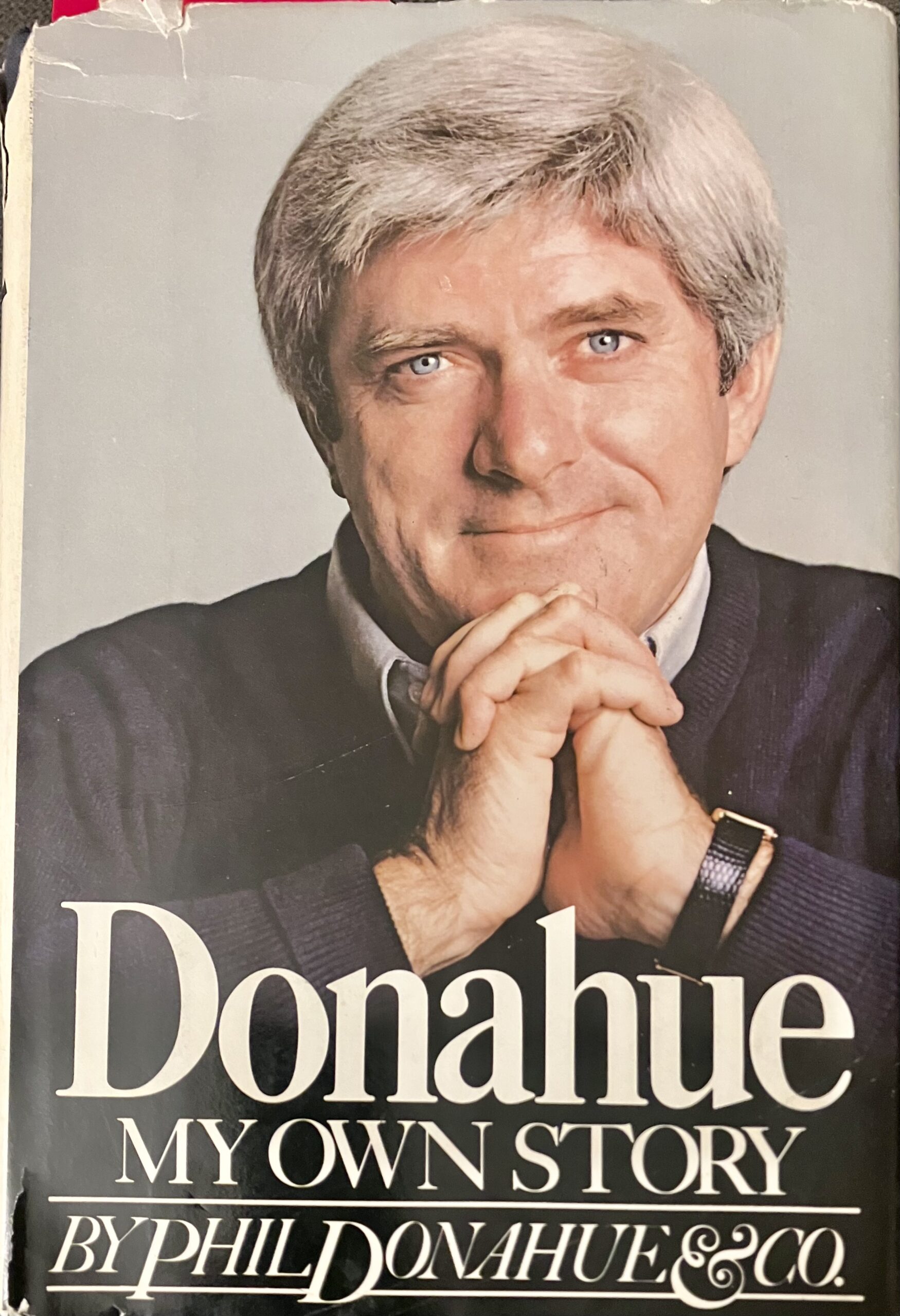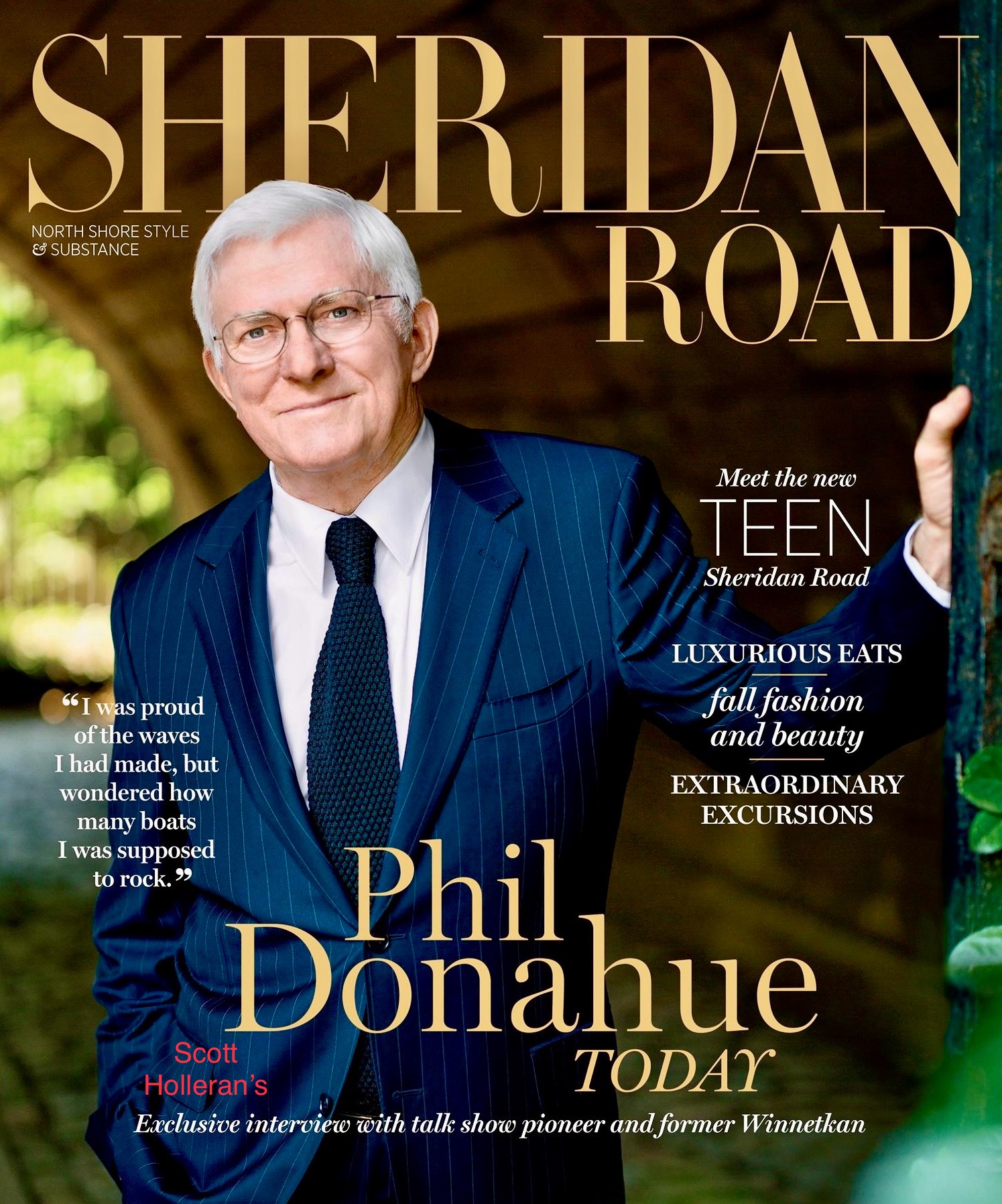By Scott Holleran
An audio recording of this article can be found at the bottom of the page.
Reflecting on how Phil Donahue changed my life, something unique to the city comes to mind: Donahue, then a divorced, single father of five children at the peak of his career, chose to take a risk in business—a risk which could have derailed, affected or improved everything he’d worked for—when he moved from Dayton, Ohio to Chicago. This might not be an obvious opening thought about the late daytime television talk show host whose program, “Donahue”, aired in some form for almost 30 years. That Donahue chose Chicago speaks to his virtue, character and philosophy of exercising and magnifying the free press and free speech.
Donahue, who recently died at 88, was born in the Midwest. Schooled by Catholic teachers throughout his life, from his childhood in Cleveland through the beginning of his journalism at the University of Notre Dame in South Bend, Indiana, his career, particularly his brand of topical interviews, took root with principled thinking in Ohio. Donahue could’ve stayed in Dayton; he had success there. At a certain point—long before Kardashians, Winfrey and today’s hollow celebrity culture—Donahue decided to stake his uniquely intellectual claim in Chicago. Until then, daytime Chicago TV had been dominated by Steve Edwards on “A.M. Chicago”, Ray Rayner, soap opera, Frazier Thomas and Bozo the clown.

Donahue’s arrival was heralded as an event—which it was—preceded by his daring approach to topical TV; in Dayton, he’d booked and interviewed a woman who single-handedly challenged the unconstitutional state sanction of prayer in government-run schools, an atheist named Madalyn Murray O’Hair, among other controversial figures. The man who became a white-haired host with a microphone pioneered two practices which paved the way for TV as well as talk radio and podcasting. Donahue, who had debuted “The Phil Donahue Show” in 1967, invited listeners to use the telephone to call with questions for his guests on a one-hour program and he roamed the audience (of mostly women) soliciting their questions, too. No one had done that before Phil Donahue, not on a wide scale.
But Donahue fundamentally changed the industry with topics, not merely tactics. He took seriously the claims of boys who’d been abused by Catholic priests. He aired interviews with men who are gay and conducted the interviews without casting aspersions or reinforcing stereotypes. He discussed abortion with people who’d requested and performed abortions. He interviewed women who spoke for themselves answering why their lives were improved by having an abortion. Who does that now? If and when someone does, it’s often framed as a dogma, without scrutiny, curiosity or discernment. This makes Donahue—who later made documentaries and was fired from leftist cable news channel MSNBC for opposing a new American war—different.
Time and again, Donahue was drawn to controversial topics, issues and stories. He was undaunted. Whether free speech was tested with a proposed Nazi march in Skokie or professional tennis was challenged with a competing athlete who was born a man and opted for transsexualism—calling himself a woman, seeking to compete in women’s sports—Phil Donahue broadcast the story with forethought, facts and a desire to listen, learn and understand. He did this with deliberation—the opposite approach of what drives today’s fleeting, fragmented, trend-centered media: Donahue interviewed with regard for principles, words as concepts, context, values and themes and he asked honest, frank and tactful yet penetrating, intelligent and rational questions. “Donahue” was not built around shock or sensationalism, not that he didn’t indulge in some of that to compete toward the end of his show’s run. Even then, he did so with a sense of humor.

Donahue’s standout episodes include two featuring his most renowned interviews. In conversations with Ayn Rand, Donahue thoughtfully challenges the bestselling author and philosopher. They discuss her atheism, the death of her husband, Frank O’Connor (like Donahue, an Ohio native), and issues, such Arab terrorism, politics and the question of a woman as president of the United States. On the subject of grief, Rand becomes visibly moved by Donahue’s inquiry and addresses the hypothetical notion of pleading to Saint Peter at the gates of Heaven on behalf of her late husband. Donahue, who moved the show from Chicago to New York City in 1985, also conducted penetrating interviews with Bill Clinton, The Bee Gees and Muhammad Ali. Donahue interviewed everyone from John Wayne to Elton John, as well as radical New Leftists, including terrorists. A few minutes of his 1987 interview with then-author and businessman Donald Trump, in which they argue back and forth about rent control, is deeper than most of the pap that passes for today’s television interviews.
In a Chicago media cover assignment 10 years ago, I asked Mr. Donahue for an interview about his broadcasting career and his life as a famous TV host, husband and father in the suburbs of Chicago. Phil Donahue kindly said yes (you can read the interview here.) In my experience, he was sharp, intelligent, thoughtful, independent and gracious and, foremost, whether discussing why he unapologetically chose to watch Fox News, why he admired Johnny Carson or discussed marriage to his wife, Marlo Thomas, Phil Donahue was fired up. Then and now that he’s gone, he strikes me as a man who was passionate about thinking, communicating and living to the fullest every day.

Chicago’s media industry leaves an imprint on American culture which endures. Carl Sandburg, Mike Royko, Gene Siskel, John Coleman, Roger Ebert, Irv Kupcinet, Gwendolyn Brooks, Phil Ponce, Terry Savage, John Drummond, Harry Porterfield, Bill Kurtis, Clarence Page, John Kass, Bob Petty, and, of course, Studs Terkel, Walt Disney, Ernest Hemingway and L. Frank Baum—all of them challenged, transformed and improved the media. Thanks to the choice a curious broadcaster from Ohio made to come to Chicago in 1974, one can add: Phil Donahue.
Award-winning author, writer and journalist Scott Holleran lived in Chicago for 21 years and writes Industrial Revolutions. Read and subscribe to his non-fiction newsletter, Autonomia, at https://www.scottholleran.






